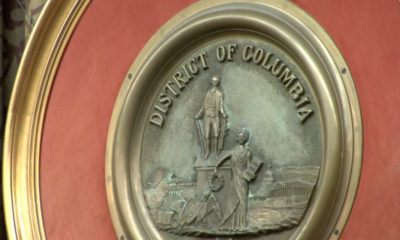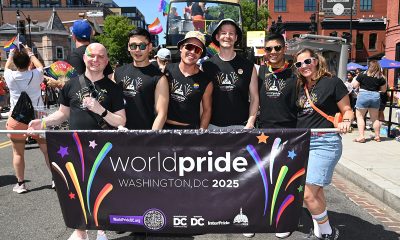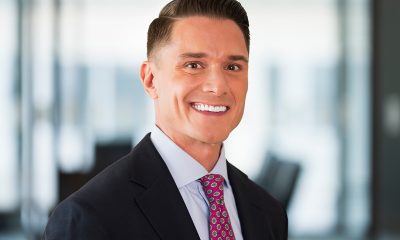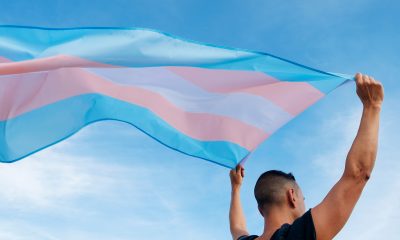Local
Gray secures Stein Club endorsement
Fenty, opponent clash over issues in D.C. mayor’s race
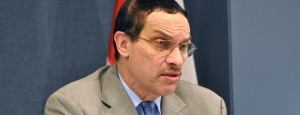
The Gertrude Stein Democratic Club this week endorsed D.C. Council Chairman Vincent Gray in the mayor’s race. (Washington Blade photo by Michael Key)
D.C. Council Chairman Vincent Gray won the Gertrude Stein Democratic Club mayor’s race endorsement Monday, exceeding a required vote threshold of 60 percent by just three votes.
Activists familiar with the club, the city’s largest gay political group, had expected Gray to win more votes than D.C. Mayor Adrian Fenty. But most thought club members were more evenly split between the two contenders and that neither candidate would reach the 60 percent requirement.
“You can count on me as mayor of the District of Columbia to work with you to continue to make progress so that we could be the best jurisdiction in America for the GLBT community,” Gray said minutes after winning the endorsement.
A total 76 votes were cast in the mayor’s endorsement decision. Gray took 48 votes, or 63 percent, while Fenty received 24 votes, or 32 percent. Four people, or 5 percent, voted for no endorsement.
The endorsement came after club members voted 87 percent to 8 percent to endorse D.C. Congressional Delegate Eleanor Holmes Norton over challenger Douglas Sloan, a Ward 4 Advisory Neighborhood Commissioner. Norton is seeking re-election to an eleventh term in office.
Norton is considered to be among the most LGBT-supportive members of Congress and has a longstanding record of pushing pro-LGBT bills.
The club’s endorsement vote for Gray also came after Gray and Fenty challenged each other’s record on LGBT and non-LGBT issues during a part of the endorsement meeting designated as a candidates’ forum.
Stein Club member and radio talk show host Mark Levine, who served as moderator of the forum, said Fenty and Gray both have “very, very good records” in support of LGBT civil rights. He noted that both have been strong supporters of same-sex marriage, with Gray voting for the city’s marriage bill and Fenty signing it into law.
But written questions submitted by club members and read by Levine questioned Fenty’s record on LGBT issues during his time as mayor. One asked why his highly regarded AIDS office director, Dr. Shannon Hader, abruptly resigned two weeks ago. Another questioned why Fenty hasn’t issued a formal rescinding of a mayoral award to the anti-gay group PFOX, which Fenty has said was a mistake.
Others wanted to know why Fenty hasn’t attended the main Black Pride festival since becoming mayor and why he hasn’t used his “bully pulpit” as mayor to speak out against anti-LGBT hate crimes.
On the PFOX issue, Fenty gave his most detailed explanation to date as to why his office presented a ceremonial resolution to a group that says sexual orientation can be changed.
“The minute that this happened, when we found out that we had issued this ceremonial proclamation to PFOX, I personally said that my administration should not have done that, that it is my fault that it happened, and my apologies went out to each and every person in the city whom we had offended,” Fenty said.
“The fact of the matter is that when you have a lot of people working for you, sometimes mistakes happen,” he said. “The fact of the matter also is that as mayor of the District of Columbia, as a person who you elected, this should not have happened. I personally, professionally apologize to each and every person in this room, to each and every person in this city. … You have my assurance that I will work extremely hard to make sure nothing like this ever happens again.”
Gray, who criticized Fenty over the PFOX matter when it first surfaced earlier this year, did not address it during the Stein Forum.
Instead, he criticized Fenty for what Gray called a “confrontational” leadership style that has negatively affected his ability to lead the city on a wide range of issues.
Gray pledged to adopt a leadership marked by “cordiality” and “collegiality” that he said would foster cooperation, even on issues that are contentious, such as the public schools reform programs started by Fenty and that Gray said he supports.
Fenty said his administration has been on the forefront in support of LGBT civil rights in a number of areas at the same time it has improved city services for all residents, including LGBT residents and people with HIV/AIDS.
He praised Hader, director of the city’s HIV/AIDS Administration, for turning around what had been a trouble-plagued agency into an agency recognized nationally for its effectiveness in helping a city with the nation’s highest rate of HIV infection. He did not say during the Stein Club forum why Hader resigned.
Last week, the mayor told the Blade he believed she left in a career move to take another important job with an international health organization. He told the forum that Hader’s interim replacement, Dr. Nnemdi Kamanu-Elias, has training as a public health expert and AIDS specialist equal to that of Hader.
On public safety matters, Fenty said D.C. Police Chief Cathy Lanier has put together a “first-ever biased-crime report which hopefully will serve as a benchmark” to help police monitor and better fight hate crimes by encouraging more people to report hate crimes.
He cited Lanier’s decision to expand and decentralize the department’s Gay & Lesbian Liaison Unit — which requires all officers to be trained in LGBT-related issues and assigns GLLU-affiliated officers to each of the department’s seven police districts — as other ways to address bias-related crime.
“We can’t just have one specialized unit focusing on GLBT affairs and hate crimes,” Fenty said. “We need the entire department to do that.”
Gray, however, appeared to side with a number of activists who expressed skepticism over Lanier’s changes to the GLLU. Some activists have said the decentralized operation has detracted from the unit’s successful track record of operating as a cohesive team of mostly LGBT officers who responded to calls for service and investigated crimes against LGBT people.
“I absolutely think we do need a special unit within the [police department],” Gray said. “I think we’ve seen the success of it. One of the things I would do as mayor is hire a sergeant to run that unit, someone we know has the sensitivity to the issues that are important to us so that we will concentrate our efforts on hate crimes and other heinous crimes that are perpetrated on the basis of discrimination.”
As he has in other candidates’ forums, Fenty cited his public school reform program and the work of his public schools chancellor, Michelle Rhee, in accomplishing what he said are major improvements in student test scores. He criticized Gray for not disclosing whether he would retain or replace Rhee if elected mayor.
Following the forum, Levine asked the two candidates to step outside the hall at Town nightclub, where the event was held, to allow club members to discuss who they would support. Veteran gay activist and former Lambda Rising bookstore owner Deacon Maccubbin, former Stein Club officers Jeff Marootian and John Lazar spoke on Fenty’s behalf, saying he has been a highly effective mayor who deserves another term.
Former Whitman-Walker Clinic Deputy Director Pat Hawkins and gay Democratic activist Lane Hudson urged the club to endorse Gray, saying the Council chairman has a demonstrated record of strong support on LGBT issues.
Some Stein Club members, including Bob Summersgill, former president of the Gay & Lesbian Activists Alliance, who has not yet taken sides in the mayor’s race, said they were surprised that the Fenty campaign did not arrange for more supporters to join the club and vote for him.
“The Stein endorsement is largely an issue of campaign organizational strength,” Summersgill said. “I think that had the Fenty campaign wanted to win the endorsement, they had the means to get enough people to join and attend to swing the vote.
“It seemed like the Fenty campaign wasn’t really trying,” he said.
Other people noted that many of the same club members who voted Monday for a Gray endorsement voted four years ago to endorse then City Council Chairwoman Linda Cropp over Fenty in the mayor’s race. Fenty defeated Cropp by an overwhelming margin, and a Blade analysis of precincts with high concentrations of gay voters showed the gay vote going to Fenty by more than a three-to-one margin.
“So the question is does the Stein endorsement reflect the sentiment of the rank and file LGBT person in this city,” said Stein Vice President Sheila Alexander Reid, who supported Fenty in 2006.
Asked if she were supporting Fenty again this time, Reid said, “I want to wait until tomorrow to talk about this. I’m an officer and tonight the club made its endorsement.”
Local
Local LGBTQ groups, activists to commemorate Black History Month
Rayceen Pendarvis to moderate Dupont Underground panel on Sunday
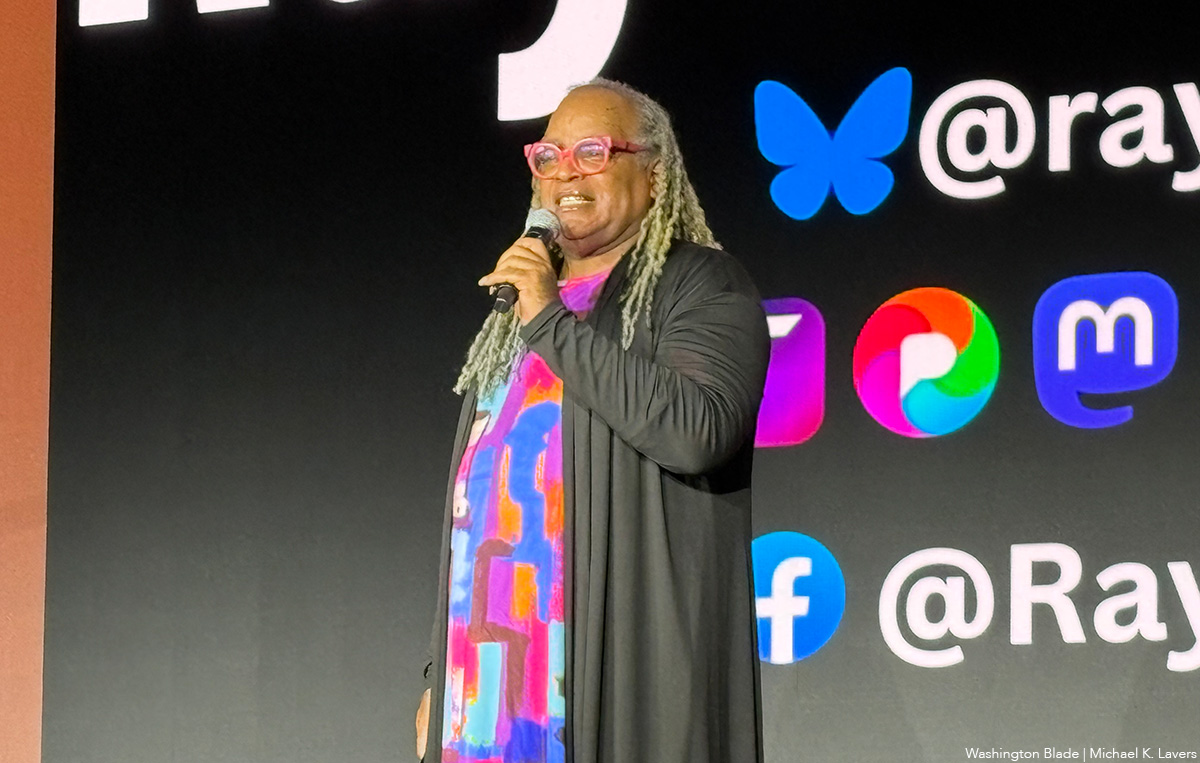
LGBTQ groups in D.C. and elsewhere plan to use Black History Month as an opportunity to commemorate and celebrate Black lives and experiences.
Team Rayceen Productions has no specific events planned, but co-founder Rayceen Pendarvis will attend many functions around D.C. this month.
Pendarvis, a longtime voice in the LGBTQ community in D.C. will be moderating a panel at Dupont Underground on Sunday. The event, “Every (Body) Wants to Be a Showgirl,” will feature art from Black burlesque artists from around the country. Pendarvis on Feb. 23 will attend the showing of multimedia play at the Lincoln Theatre that commemorates the life of James Baldwin.
Equality Virginia plans to prioritize Black voices through a weekly online series, and community-based story telling. The online digital series will center Black LGBTQ voices, specifically trailblazers and activists, and contemporary Black queer and transgender people.
Narissa Rahaman, Equality Virginia’s executive director, stressed the importance of the Black queer community to the overall Pride movement, and said “Equality Virginia is proud to center those voices in our work this month and beyond.”
The Capital Pride Alliance, which hosts Pride events in D.C., has an alliance with the Center for Black Equity, which brings Black Pride to D.C. over Memorial Day weekend. The National LGBTQ Task Force has no specific Black History Month events planned, but plans to participate in online collaborations.
Cathy Renna, the Task Force’s director of communications, told the Washington Blade the organization remains committed to uplifting Black voices. “Our priority is keeping this at the forefront everyday,” she said.
The D.C. LGBTQ+ Community Center is also hosting a series of Black History Month events.
The D.C. Public Library earlier this year launched “Freedom and Resistance,” an exhibition that celebrates Black History Month and Martin Luther King Jr. It will remain on display until the middle of March at the Martin Luther King Jr. Memorial Library at 901 G St., N.W.
District of Columbia
U.S. Attorney’s Office drops hate crime charge in anti-gay assault
Case remains under investigation and ‘further charges’ could come

D.C. police announced on Feb. 9 that they had arrested two days earlier on Feb. 7 a Germantown, Md., man on a charge of simple assault with a hate crime designation after the man allegedly assaulted a gay man at 14th and Q Streets, N.W., while using “homophobic slurs.”
But D.C. Superior Court records show that prosecutors with the Office of the U.S. Attorney for D.C., which prosecutes D.C. violent crime cases, charged the arrested man only with simple assault without a hate crime designation.
In response to a request by the Washington Blade for the reason why the hate crime designation was dropped, a spokesperson for the U.S. Attorney’s office provided this response: “We continue to investigate this matter and make no mistake: should the evidence call for further charges, we will not hesitate to charge them.”
In a statement announcing the arrest in this case, D.C. police stated, “On Saturday, February 7, 2026, at approximately 7:45 p.m. the victim and suspect were in the 1500 block of 14th Street, Northwest. The suspect requested a ‘high five’ from the victim. The victim declined and continued walking,” the statement says.
“The suspect assaulted the victim and used homophobic slurs,” the police statement continues. “The suspect was apprehended by responding officers.”
It adds that 26-year-old Dean Edmundson of Germantown, Md. “was arrested and charged with Simple Assault (Hate/Bias).” The statement also adds, “A designation as a hate crime by MPD does not mean that prosecutors will prosecute it as a hate crime.”
Under D.C.’s Bias Related Crime Act of 1989, penalties for crimes motivated by prejudice against individuals based on race, religion, sexual orientation, gender identity, disability, and homelessness can be enhanced by a court upon conviction by one and a half times greater than the penalty of the underlying crime.
Prosecutors in the past both in D.C. and other states have said they sometimes decide not to include a hate crime designation in assault cases if they don’t think the evidence is sufficient to obtain a conviction by a jury. In some instances, prosecutors have said they were concerned that a skeptical jury might decide to find a defendant not guilty of the underlying assault charge if they did not believe a motive of hate was involved.
A more detailed arrest affidavit filed by D.C. police in Superior Court appears to support the charge of a hate crime designation.
“The victim stated that they refused to High-Five Defendant Edmondson, which, upon that happening, Defendant Edmondson started walking behind both the victim and witness, calling the victim, “bald, ugly, and gay,” the arrest affidavit states.
“The victim stated that upon being called that, Defendant Edmundson pushed the victim with both hands, shoving them, causing the victim to feel the force of the push,” the affidavit continues. “The victim stated that they felt offended and that they were also gay,” it says.
District of Columbia
Capital Pride wins anti-stalking order against local activist
Darren Pasha claims action is linked to his criticism of Pride organizers

A D.C. Superior Court judge on Feb. 6 partially approved an anti-stalking order against a local LGBTQ activist requested last October by the Capital Pride Alliance, the D.C.-based LGBTQ group that organizes the city’s annual Pride events.
The ruling by Judge Robert D. Okun requires former Capital Pride volunteer Darren Pasha to stay at least 100 feet away from Capital Pride’s staff, board members, and volunteers until the time of a follow up court hearing he scheduled for April 17.
In his ruling at the Feb. 6 hearing, which was virtual rather than held in-person at the courthouse, Okun said he had changed the distance that Capital Pride had requested for the stay-away, anti-stalking order from 200 yards to 100 feet. The court records show that the judge also denied a motion filed earlier by Pasha, who did not attend the hearing, to “quash” the Capital Pride civil case against him.
Pasha told the Washington Blade he suffered an injury and damaged his mobile phone by falling off his scooter on the city’s snow-covered streets that prevented him from calling in to join the Feb. 6 court hearing.
In his own court filings without retaining an attorney, Pasha has strongly denied the stalking related allegations against him by Capital Pride, saying “no credible or admissible evidence has been provided” to show he engaged in any wrongdoing.
The Capital Pride complaint initially filed in court on Oct. 27, 2025, includes an 18-page legal brief outlining its allegations against Pasha and an additional 167-page addendum of “supporting exhibits” that includes multiple statements by witnesses whose names are blacked out.
“Over the past year, Defendant Darren Pasha (“DSP”) has engaged in a sustained, and escalating course of conduct directed at CPA, including repeated and unwanted contact, harassment, intimidation, threats, manipulation, and coercive behavior targeting CPA staff, board members, volunteers, and affiliates,” the Capital Pride complaint states.
In his initial 16-page response to the complaint, Pasha says the Capital Pride complaint appears to be a form of retaliation against him for a dispute he has had with the organization and its then president, Ashley Smith, last year.
“It is evident that the document is replete with false, misleading, and unsubstantiated assertions,” he said of the complaint.
Smith, who has since resigned from his role as board president, did not respond to a request by the Blade for comment at the time the Capital Pride court complaint was filed against Pasha.
Capital Pride Executive Director Ryan Bos and the attorney representing the group in its legal action against Pasha, Nick Harrison, did not immediately respond to a Blade request for comment on the judge’s Feb. 6 ruling.

